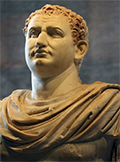The Roman Emperor Titus
Titus was emperor of Rome for two years in the 1st Century. He is known for finishing the Colosseum and the destruction of Jerusalem. He was also ruler during the destruction of Pompeii and Herculaneum caused by the eruption of Mount Vesuvius. 
He was born on Dec. 30, 39, in Rome. His father, who became the emperor Vespasian, was of low birth and distinguished him military, leading the second legion in the conquest of Britain in 43. After this, Titus had access to a classical education and studied Greek and Latin, poetry and plays. He enjoyed music and learned to play the harp. He enjoyed the close friendship of Britannicus, the sone of the emperor Claudius, and later had built a handful of statues of his friend after he died of poisoning, many sources say at the instigation of Agrippina, Claudius's wife. Titus joined the military when he was 18 and served as a military tribune in Britain and Germany. After just a couple of years, he left the army and entered the legal profession. He married twice: first to Arrecina Tertulla, who died not long after their marriage, and second to Marcia Furnilla. His second marriage ended in divorce after husband and wife took opposing sides during the Piso Conspiracy, a plot in 65 to overthrow the emperor Nero. Titus returned to the army, joining his father in quelling the Jewish revolt in Judea. When Vespasian left to become emperor, in 69, Titus remained and ended the Jewish revolt, dramatically reducing the opposition by destroying the Temple in Jerusalem. In fact, the Romans pulled down all of the walls in the city except one. This is known as the Wailing Wall. Titus returned to Rome in 71 and served as his father's right hand, dictating letters, enacting policy, and protecting his father from plots against him. He served as both consul and head of the Praetorian Guard. When his father died, in 79, Titus became emperor. 
Like a great many people in the Roman Empire, Titus was greatly saddened by the loss of life caused by the eruption of Mount Vesuvius. At almost precisely noon on August 24, 79, the volcano, which that been quiet for hundreds of years, suddenly spewed forth a huge explosion that rocked the countryside for a huge number of miles around and creating a mushroom cloud of ash and debris 10 miles high. Fire and debris rained on Pompeii, and most people fled. A few, perhaps as many as 2,000, stayed, hoping that things wouldn't get any worse. It did. The very next morning, a cloud of toxic gas, fumes from the volcano, wafted through the city, killing all who breathed it. A rockslide followed, burying the dead where they lay. Herculaneum was much the same story, with the death-dealing blow being a monstrous cloud of hot ash and gas surging through the city, killing all who had stayed. Not long after, a massive rock- and mudslide engulfed the city. Titus toured the area and donated large sums of money to the cleanup efforts in the two devastated areas and to the relief efforts for victims elsewhere. 
Titus shared his father's penchant for new construction and ordered the construction of the Temple of Jupiter Optimus Maximus and a new imperial baths. He also oversaw the completion of the Colosseum. A full 100 days of celebration marked the opening of the building otherwise known as the Flavian Amphitheater in 80. Gladiator battles, mock naval battles, fights between different kinds of animals, and horse and chariot races punctuated the celebrations. After the great games at the Colosseum closed, Titus left Rome. He died of a fever, on Sept. 13, 81, in the same villa in which his father had died. He was 42 and had been emperor for 2 years, 2 months, and 20 days. His brother Domitian succeeded him. Titus's last words were said to have been, "I have made but one mistake."
|
|
Social Studies for Kids
copyright 2002–2026
David White




